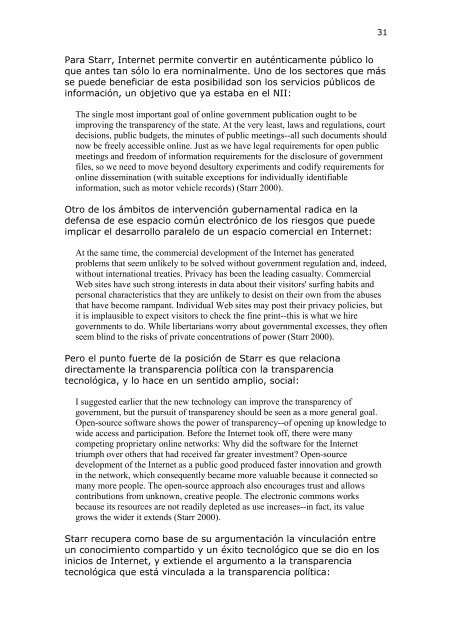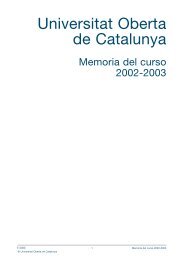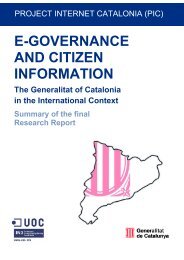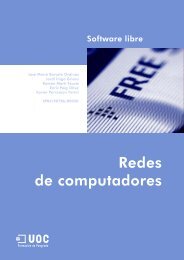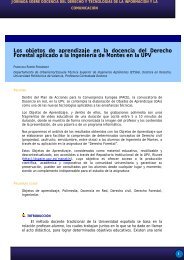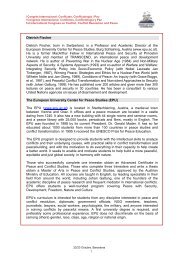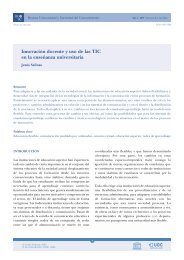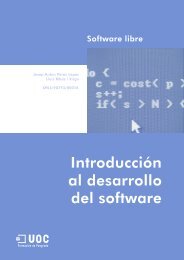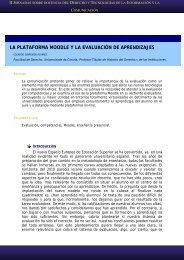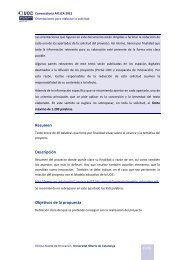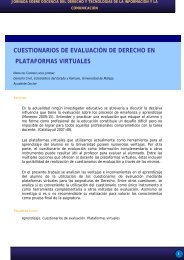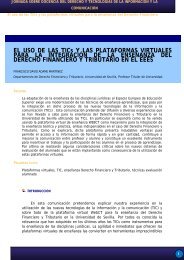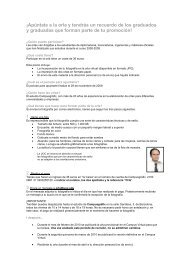El uso del software libre en las administraciones públicas de la UE
El uso del software libre en las administraciones públicas de la UE
El uso del software libre en las administraciones públicas de la UE
You also want an ePaper? Increase the reach of your titles
YUMPU automatically turns print PDFs into web optimized ePapers that Google loves.
31Para Starr, Internet permite convertir <strong>en</strong> auténticam<strong>en</strong>te público loque antes tan sólo lo era nominalm<strong>en</strong>te. Uno <strong>de</strong> los sectores que másse pue<strong>de</strong> b<strong>en</strong>eficiar <strong>de</strong> esta posibilidad son los servicios públicos <strong>de</strong>información, un objetivo que ya estaba <strong>en</strong> el NII:The single most important goal of online governm<strong>en</strong>t publication ought to beimproving the transpar<strong>en</strong>cy of the state. At the very least, <strong>la</strong>ws and regu<strong>la</strong>tions, court<strong>de</strong>cisions, public budgets, the minutes of public meetings--all such docum<strong>en</strong>ts shouldnow be freely accessible online. Just as we have legal requirem<strong>en</strong>ts for op<strong>en</strong> publicmeetings and freedom of information requirem<strong>en</strong>ts for the disclosure of governm<strong>en</strong>tfiles, so we need to move beyond <strong>de</strong>sultory experim<strong>en</strong>ts and codify requirem<strong>en</strong>ts foronline dissemination (with suitable exceptions for individually id<strong>en</strong>tifiableinformation, such as motor vehicle records) (Starr 2000).Otro <strong>de</strong> los ámbitos <strong>de</strong> interv<strong>en</strong>ción gubernam<strong>en</strong>tal radica <strong>en</strong> <strong>la</strong><strong>de</strong>f<strong>en</strong>sa <strong>de</strong> ese espacio común electrónico <strong>de</strong> los riesgos que pue<strong>de</strong>implicar el <strong>de</strong>sarrollo paralelo <strong>de</strong> un espacio comercial <strong>en</strong> Internet:At the same time, the commercial <strong>de</strong>velopm<strong>en</strong>t of the Internet has g<strong>en</strong>eratedproblems that seem unlikely to be solved without governm<strong>en</strong>t regu<strong>la</strong>tion and, in<strong>de</strong>ed,without international treaties. Privacy has be<strong>en</strong> the leading casualty. CommercialWeb sites have such strong interests in data about their visitors' surfing habits andpersonal characteristics that they are unlikely to <strong>de</strong>sist on their own from the abusesthat have become rampant. Individual Web sites may post their privacy policies, butit is imp<strong>la</strong>usible to expect visitors to check the fine print--this is what we hiregovernm<strong>en</strong>ts to do. While libertarians worry about governm<strong>en</strong>tal excesses, they oft<strong>en</strong>seem blind to the risks of private conc<strong>en</strong>trations of power (Starr 2000).Pero el punto fuerte <strong>de</strong> <strong>la</strong> posición <strong>de</strong> Starr es que re<strong>la</strong>cionadirectam<strong>en</strong>te <strong>la</strong> transpar<strong>en</strong>cia política con <strong>la</strong> transpar<strong>en</strong>ciatecnológica, y lo hace <strong>en</strong> un s<strong>en</strong>tido amplio, social:I suggested earlier that the new technology can improve the transpar<strong>en</strong>cy ofgovernm<strong>en</strong>t, but the pursuit of transpar<strong>en</strong>cy should be se<strong>en</strong> as a more g<strong>en</strong>eral goal.Op<strong>en</strong>-source <strong>software</strong> shows the power of transpar<strong>en</strong>cy--of op<strong>en</strong>ing up knowledge towi<strong>de</strong> access and participation. Before the Internet took off, there were manycompeting proprietary online networks: Why did the <strong>software</strong> for the Internettriumph over others that had received far greater investm<strong>en</strong>t? Op<strong>en</strong>-source<strong>de</strong>velopm<strong>en</strong>t of the Internet as a public good produced faster innovation and growthin the network, which consequ<strong>en</strong>tly became more valuable because it connected somany more people. The op<strong>en</strong>-source approach also <strong>en</strong>courages trust and allowscontributions from unknown, creative people. The electronic commons worksbecause its resources are not readily <strong>de</strong>pleted as use increases--in fact, its valuegrows the wi<strong>de</strong>r it ext<strong>en</strong>ds (Starr 2000).Starr recupera como base <strong>de</strong> su argum<strong>en</strong>tación <strong>la</strong> vincu<strong>la</strong>ción <strong>en</strong>treun conocimi<strong>en</strong>to compartido y un éxito tecnológico que se dio <strong>en</strong> losinicios <strong>de</strong> Internet, y exti<strong>en</strong><strong>de</strong> el argum<strong>en</strong>to a <strong>la</strong> transpar<strong>en</strong>ciatecnológica que está vincu<strong>la</strong>da a <strong>la</strong> transpar<strong>en</strong>cia política:


